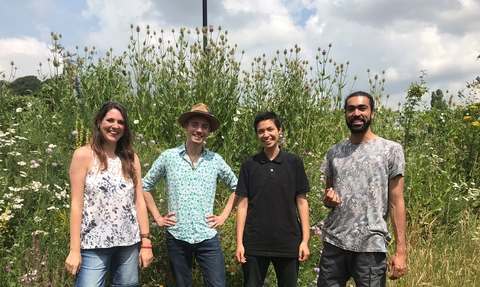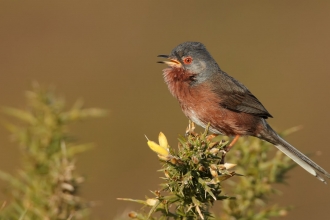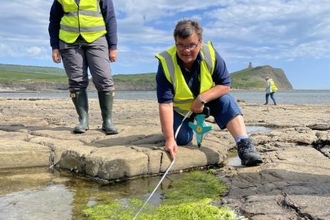
Wild Paths
Reflecting on the success of Wild Paths
Thanks to the incredible success of this project, 26 trainees were able to find their pathway to a career in conservation. In the beautiful video below, we find out what the Wild Paths project means to the trainees and mentors who took part, and how it was able to turn dreams of working in conservation into a reality.
Wild Paths - careers in conservation. (https://www.youtube.com/watch?v=I2hyTu32lCk)
Wild Paths - careers in conservation.
Wild Paths: Helping people into conservation careers
Wild Paths was a three-year project jointly hosted by Avon, Devon, Dorset, Somerset and Wiltshire Trusts to give people from diverse backgrounds the opportunity to undertake a ten-month long training placement in practical conservation and engagement skills. Thanks to National Lottery players for their support for the Wild Paths programme from the Heritage Fund (NLHF) Skills for the Future (SFF) Programme which provides funding to organisations that provide work-based training placements to meet a skills shortage in the heritage sector and help diversify the workforce.
If you or your organisation would like to run or fund your own traineeship programme, then check out our inclusive traineeship toolkit for more information.
Want to find out about our previous training scheme Wildlife Skills?
From 2014-17, the Wildlife Skills Training for a Career in Nature Conservation programme funded through the National Lottery Heritage Fund (NLHF) Skills for the Future delivered 57 training placements in a range of conservation skills for people from diverse backgrounds across four Wildlife Trusts in the south west of England; Devon, Dorset, Somerset and Wiltshire. Forty-seven (82%) highly trained individuals are now employed in the sector, with the other 10 in further training, or expected to gain employment very soon. You can see a report on the download below.
Case studies
There are so many personal stories from the programme about how trainees’ lives have been changed. Below are some statements from trainees and case studies of four former trainees.
“Without this traineeship I wouldn’t be working in conservation, I owe my career to this scheme. I had gotten to the point where I had decided this was my last try of getting into the sector and that I would redirect if it didn’t work out, luckily I didn’t have to do that” - PC trainee, now working for WT
“Before I had my traineeship, all I had to write in the ‘Relevant Qualifications’ box on job application forms was my degree and a first aid course. When a Person Specification asked for a long list of ‘tickets’ it decreased my chances of success before I even started. Now the list is rather more substantial! Have finally got my dream job and it’s all thanks to that amazing year in Somerset” – PC trainee, now working for RSPB
“Thanks also to the Heritage Lottery Fund, without whom my traineeship would not have been possible. Their funding brings so many projects to life within wildlife conservation; in my case, their funding empowered me to leave a profession that my heart was no longer in and begin dedicating my working life to my love for the natural world” – CE trainee, now working for local authority as community ranger
You can read more about our Wildlife Skills trainees on the download below.
Want to find out about our previous training scheme Dorset Wildlife Trust Conservation Skills?
The Dorset Wildlife Trust Conservation Skills Programme funded through Heritage Lottery Fund (HLF) Skills for the Future provided opportunities for 31 individuals to become trained in the skills and knowledge required to pursue a career in practical nature conservation, and to reinforce the practical nature conservation workforce in Dorset. 87% of trainees (27 individuals) gained employment in the sector within 1 year, and 18 of these continue to work within Dorset.
Identifying the skills gap
It was important that the project didn't simply provide a great opportunity for a lucky few to have an enjoyable year of training. Of prime importance was addressing any skills gaps within the conservation sector. Notably, it had become only too clear that although there were always plenty of applications for practical jobs at Dorset Wildlife Trust, often there would be very few that had the relevant heritage skills and experience to be successful. It was there that the initial focus was placed. A programme was therefore established that would lead to a trainee completing their year with a full set of qualifications and experience such that they would be in a position to fill the gaps identified in the rural skills sector, with little or no further training needs.
Selection of trainees
With the traineeship providing all the qualifications and skills required for a promising future in the sector, it was accepted that there should be no formal educational or qualification entry requirements. The main consideration when selecting individuals was their enthusiasm, their commitment and to some extent, their personal qualities. These qualities are not something that can be easily built in one year, but are essential in gaining employment in the future. Whilst there were formal interview sessions involved in the selection process, perhaps the best source of information on each candidate came from feedback from mentors leading group activities or even through discussion during breaks/lunch. Selected trainees worked within one of four teams, and it was important that the teams had a significant part to play in selecting 'their' trainee as it built confidence and strong ties from the very start of the traineeship.
The training year
Training was delivered through a variety of means. Formal qualifications such as Chainsaw, Brushcutter etc were gained through courses run by Dorset Training Group. First, aid, Health & safety, Forest Schools and other such qualifications were gained through other external training providers. These qualifications were then consolidated by work carried out within the relevant teams across Dorset Wildlife Trust.
In-house training provided the opportunity to learn from the wealth of experience offered by staff. Built in to these activities were the common themes or working methods such as risk assessments, training plans, meeting delivery targets and engagement activities. As part of personal development training, the focus was on soft skills such as empathy, assertiveness, interview techniques and low-level coaching.
Trainees were able to work and train together several times per month, to confirm and build their working relationships as a team. Such training was often built into an identification and survey workshop, with trainees gaining valuable experience in a wide variety of species. The trainee team days proved to be particularly valuable as the year progressed, as each felt able to support and assist other trainees as the need arose.
Trainees were encouraged to share their experiences on a number of social media platforms, and the Dorset Wildlife Trust Trainees blog is well worth a read for some excellent examples of the training successes over the course of the four year project.
The results
Several trainees were able to progress directly into employment within the conservation sector before completing their full traineeship year. This resulted in the opportunity to create shorter length traineeships, thereby providing further development for individuals that had already gained some qualifications/skills. As a result, the Dorset Wildlife Trust Skills for the Future programme has been able to train a total of 31 individuals over the course of the four years.
We have maintained contact with all our trainees, continuing to offer support and guidance as well as keeping up with the latest news in the various careers. The success of the programme can be easily measured through employment within the conservation skills sector. Currently sitting at around 90%, our trainees are highly employable. Comments from prospective employers have reinforced this view:
"It is refreshing to read an application from someone who not only meets our skills criteria, but also has gained valuable experience and consolidation of such skills"
Case studies
Nikki Hesketh Roberts was one of the 2012 trainees. She had previously spent a number of years in an office environment but wanted to pursue a career in conservation. After volunteering with the Dorset Wildlife Trust she made the decision to apply for a traineeship position with the Urban & East Dorset team, based at the Urban Widlife Centre.
“During my year as a trainee I enjoyed working in the countryside, seeing lots of different habitats and species and developing my identification skills. I also liked putting the chainsaw and brushcutter training into practice, working with volunteers and corporate groups and giving talks and guided walks. The Skills for the Future programme provided training and opportunities for me that I otherwise would not have been able to access”
After succesfully completing her traineeship, Nikki was quickly able to gain employment in the sector as a Countryside Ranger. She has since moved into an ecologist role, and is firmly established in her new career.
Jess Tilley was one of the 2011 trainees, and was working as an office temp when she got the call to confirm that she had been accepted as one of the first trainees of the new programme. She threw herself into her training year with huge amounts of enthusiasm and a smile that never left her face.
Cohort 1 (Megan, Jess, Becky, John)
"I absolutely loved my training year, and learnt so much from everyone"
"I thought I was stuck in a career of office work, and I am so thankful for the opportunity to get away from that into my dream job of being a Ranger"
"It's such a great feeling to know that I'm able to play my part in ensuring that our rural heritage is not lost"
Jess initially worked as a self employed conservation contractor, before progressing into warden roles in East Dorset. She worked as a Ranger, based at the Moors Valley Country Park near Verwod, but returned to Dorset Wildlife Trust in 2017 as a Conservation Officer responsible for grassland restoration on Portland.






